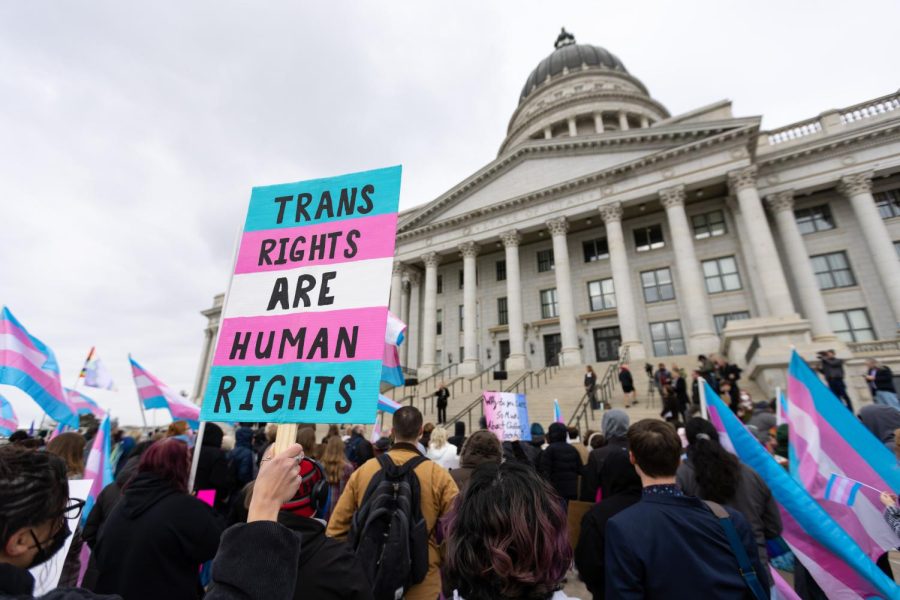Utah’s Gender-Affirming Care Ban is Harmful to Transgender Youth, Professors and Trans Student Say
Demonstrators at the Utah State Capitol in Salt Lake City before the hearing of H.B. 132 and S.B. 16 in the House Health and Human Services Committee on Tuesday, Jan. 25, 2023. Both H.B. 132 and S.B. 16 restrict gender-affirming care for minors in Utah. (Photo by Xiangyao “Axe” Tang | The Daily Utah Chronicle)
February 17, 2023
Last year, Gov. Spencer Cox vetoed a bill that would’ve prohibited transgender athletes from competing in women’s sports. Now he has signed a law that effectively bans gender-affirming care for transgender youth.
Gender-affirming care includes any interventions, whether they are “social, psychological, behavioral, [or] medical … ‘designed to support and affirm an individual’s gender identity’ when it conflicts with the gender they were assigned at birth,” according to the Association of American Medical Colleges.
Because of the new bill, any transgender person under the age of 18 in Utah will now be unable to receive any hormonal therapy or surgical treatment to change their gender, according to The Salt Lake Tribune.
However, this isn’t the first time similar legislation has been brought up, with a bill attempting to ban gender-affirming care failing during the 2022 legislative session.
According to Alex Bunker, a sophomore at the University of Utah studying games, the Utah Legislature has tried to write this bill into law in the past but never had because of the community’s reaction to it.
“I wasn’t surprised that it was brought up,” Bunker said. “I was surprised that it passed just because we’ve made such a hard stance on it in the past so it hasn’t gone through.”
Being transgender himself, Bunker said the bill shocked him, and without the gender-affirming care he received when he was younger, he wouldn’t be where he is right now.
“I was pretty devastated because I started testosterone at 16 and that was really important for me with becoming who I am and just in my own personal comfort with my own body,” Bunker said. “It was really hard being a kid and being trans at kind of an earlier age. Knowing that so many kids are going to have to deal with that without the tools that I had is pretty disturbing, honestly.”
This bill sends a message to the transgender community that they do not matter to politicians, said Kim Hackford-Peer, associate chair of gender studies at the U, and that they are not allowed to decide who they are.
“Gender-affirming health care bans are one thing, but this is coupled with legislation that also says ‘Oh, by the way, we also don’t even respect your ability to like, say who you are, much less work toward making your body match or work for you,’” Hackford-Peer said.
With Utah’s transgender youth now unable to access gender-affirming care, Hackford-Peer said, many young adults and teens are going to suffer from a decline in mental health affecting every part of their lives.
“They’re exhausted,” Hackford-Peer said. “They’re probably not focusing in school. The problem is like all these other things that young people are supposed to be able to do, how do you do those things when your very existence is being challenged and disrespected?”
According to Claudia Geist, associate professor of sociology and gender studies at the U, many transgender people will also experience some form of exclusion on top of mental health issues, especially if they don’t have a reliable support system.
“The school environment is specifically sending signals off that you cannot be part of it,” Geist said. “There’s another layer of exclusion … everything is telling you society, the state, the school system, is like ‘No, sorry, we’re just not made for you.’”
Lawmakers say that gender-affirming care was banned because of the lack of research, but this contradicts what some researchers have said, according to Bunker.
“The fact that they think that they know better than my parents, myself, my doctor, my therapist, is, I think, arrogant and really ignorant,” Bunker said. “I really hope that people come to their senses and realize that there already is a lot of research and implements in place to get kids who want [gender-affirming care] and actually need it on those medications.”
The Utah Legislature is ignoring the opinions of transgender youth, said Evan Miller, a junior studying psychology and gender studies, and he hopes the lawmakers will change their perspectives.
Banning gender-affirming care for transgender youth is a bad idea, Miller said, adding, “I just hope they will start listening to the people in their community.”








